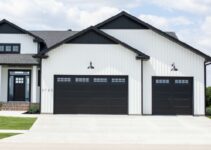How much is garage door? This is a common question for homeowners looking to invest in this important component of their property.
When I first embarked on my garage door-buying journey, one question echoed in my mind: How much will it cost me? I quickly realized that the answer depends on various factors that can significantly influence the price tag.
In this article, I’ll provide you with insight, reporting, research, and original analysis to help you understand the factors that influence garage door costs.
Factors Affecting Garage Door Costs
When determining the cost of a garage door, several factors come into play. Understanding these factors can help you make an informed decision and budget accordingly. Here are some key factors that can affect the price of a garage door:
- Type of Garage Door: There are several types of garage doors available, including sectional, roll-up, sliding, and swing-out. Each type has its own design, mechanism, and materials, which can impact the cost. Sectional doors, for example, are the most common and typically more affordable than other types.
- Material: Garage doors are available in various materials, each with its own characteristics and price range. Common materials include steel, aluminum, wood, and fiberglass. Steel doors are durable, low-maintenance, and generally more affordable, while wooden doors offer a natural and classic look but tend to be more expensive.
- Size: The size of the garage door will directly affect the cost. Larger doors require more materials and labor for installation, resulting in higher prices. It’s essential to accurately measure the opening and consider any customization needs to ensure the right fit and functionality.
- Insulation: Insulated garage doors provide better temperature control and can help reduce energy costs. However, they tend to be more expensive than non-insulated doors. The level of insulation, measured by the R-value, can impact the price. Higher R-values indicate better insulation and often come at a higher cost.
- Design and Style: Garage doors come in various designs, styles, and finishes to match different architectural aesthetics. The complexity of the design, the presence of decorative elements, and the customization options can all influence the cost. Custom designs and unique finishes may come at a premium price.
- Additional Features: Garage doors can include additional features that enhance convenience, security, and functionality. These may include windows, decorative hardware, smart home integration, remote-controlled operation, and more. The inclusion of these features can increase the overall cost of the door.
- Brand and Quality: The reputation and quality of the manufacturer can impact the price of the garage door. Established brands with a history of producing high-quality and reliable products may have higher price points. However, investing in a reputable brand often ensures durability and long-term performance.
- Installation Costs: The cost of professional installation should also be factored in. It’s crucial to hire experienced and reputable installers to ensure proper installation, which can affect the performance and longevity of the door. Installation costs may vary depending on the complexity of the project, location, and any additional work required.
- Local Factors: Garage door prices can also be influenced by regional factors such as local competition, supply and demand, and the cost of living in the area. Prices may vary from one region to another, so it’s beneficial to research local market trends and gather multiple quotes for comparison.

Garage Door Cost by Type
When it comes to garage doors, there are various types available, each with its own unique features and price range. Understanding the cost variations based on different types of garage doors can help you make an informed decision that fits your budget and requirements. Here are some of the most common types of garage doors and their average costs:
Carriage Garage Doors
Carriage garage doors are a classic and elegant option, often made from wood or steel. These doors feature a distinctive swing-out or swing-up design that adds a touch of sophistication to any home. The average cost of carriage garage doors ranges from $5,500.
French Garage Doors
French garage doors are known for their charm and beauty. These doors have glass double doors that open outward from the center, creating a visually stunning entrance to your garage. The average cost of French garage doors is approximately $3,750.
Glass Roll-Up Garage Doors
Glass roll-up doors are a modern and sleek choice that combines the functionality of a garage door with the elegance of glass panels. These doors are typically hinged with aluminum or steel and roll up in sections. The average cost of glass roll-up garage doors is around $3,800.
Roll-Up Garage Doors
Roll-up garage doors are practical and space-saving, making them ideal for garages with limited ceiling space. These doors consist of steel horizontal sheets that roll up over a drum above the door opening. Roll-up garage doors are known for their durability and affordability, with an average cost of approximately $950.
Standard Panel Garage Doors
Standard panel garage doors are the most common and cost-effective option. They feature a single unit that slides up when opened, making them easy to install. These doors are available in various materials, styles, and colors to suit different preferences. The average cost of standard panel garage doors is around $550.
Tilt-Up Garage Doors
Tilt-up garage doors have a simple yet functional design. These doors consist of one solid panel that lifts off the floor and slides into a section on top of the garage. Tilt-up doors can be either fully or partially retractable, providing convenience and versatility. The average cost of tilt-up garage doors is approximately $850.
Walk-Through Garage Doors
Walk-through garage doors are a convenient option that includes an access door embedded within the main garage door. This allows you to enter and exit the garage without fully opening the entire door, providing easy access for pedestrians. The average cost of walk-through garage doors is around $2,850.
Read Also:
The Cheapest and Most Affordable Garage Doors
| Garage Door Type | Average Cost |
|---|---|
| Carriage | $5,500 |
| French | $3,750 |
| Glass Roll-up | $3,800 |
| Roll-up | $950 |
| Standard Panel | $550 |
| Tilt-up | $850 |
| Walk-through | $2,850 |
Garage Door Cost by Material
The material of the garage door significantly impacts its cost. Here are some common garage door materials and their average costs:
Steel
Steel garage doors are durable, low-maintenance, and suitable for various climates.
- Average Cost: $600–$2,000
Aluminum
Aluminum garage doors are lightweight, corrosion-resistant, and relatively affordable.
- Average Cost: $700–$2,100
Faux Wood
Faux wood garage doors offer the appeal of real wood without the high maintenance and susceptibility to weather damage.
- Average Cost: $950–$4,100
Fiberglass
Fiberglass garage doors are lightweight, durable, and can mimic the appearance of wood.
- Average Cost: $1,000–$2,100
Vinyl
Vinyl garage doors are resistant to dents, rust, and corrosion. They are also energy-efficient.
- Average Cost: $1,000–$2,500
Wood
Wood garage doors offer a natural and classic look but require regular maintenance to prevent weathering and warping.
- Average Cost: $1,200–$4,000
Custom/High-end Materials
High-end garage doors often use custom materials such as solid wood, exotic woods, or specialized designs. The cost can vary significantly depending on the material and customization.
- Average Cost: $4,000–$10,000+
| Garage Door Material | Average Cost Range |
|---|---|
| Steel | $600 – $2,000 |
| Aluminum | $700 – $2,100 |
| Faux Wood | $950 – $4,100 |
| Fiberglass | $1,000 – $2,100 |
| Vinyl | $1,000 – $2,600 |
Garage Door Cost by Size
The size of your garage door plays a significant role in determining its cost. Larger doors generally require more materials and labor, resulting in higher prices. Here are some common garage door sizes and their average costs:
Single Garage Doors
Single garage doors are typically designed to accommodate one car and are available in standard sizes of 8 feet wide by 7 feet tall, 9 feet wide by 7 feet tall, and 10 feet wide by 7 feet tall.
The average cost for a single garage door ranges from $600 to $1,500, depending on factors such as material, insulation, and design.
Double Garage Doors
Double garage doors are intended to fit two vehicles side by side and are available in standard sizes of 12 feet wide by 7 feet tall, 14 feet wide by 7 feet tall, and 16 feet wide by 7 feet tall.
The average cost for a double garage door starts at around $800 and can go up to $4,000 or more, depending on the chosen material, insulation, and style.
Oversized Garage Doors
For larger vehicles or customized garage spaces, oversized garage doors are required. These doors are available in various sizes, such as 18 feet wide by 7 feet tall, 20 feet wide by 8 feet tall, and 24 feet wide by 8 feet tall.
Due to their larger dimensions, oversized garage doors tend to have higher costs compared to standard-sized doors.
The average cost for an oversized garage door can range from $1,500 to $6,000 or more, depending on factors like material, insulation, and customization options.
| Garage Door Size | Average Cost Range |
|---|---|
| Single Garage Doors | $600 – $1,500 |
| Double Garage Doors | $800 – $4,000 or more |
| Oversized Garage Doors | $1,500 – $6,000 or more |
Read Also:
How Much Does It Cost to Build a 2-Car Garage?
Additional Cost Factors
Beyond the type, material, and size, several other factors can affect the overall cost of a garage door:
Insulation
Insulated garage doors offer energy efficiency and noise reduction. They usually come with a higher price tag compared to non-insulated options.
- Average Cost: $100–$500 extra, depending on the size and insulation type.
Windows
Adding windows to your garage door can enhance its aesthetic appeal and natural light. The cost varies depending on the number of windows and their design.
- Average Cost: $200–$600 per window.
Hardware and Accessories
Upgrading your garage door with decorative hardware, such as handles and hinges, or additional features like a wireless opener or smart integration, will increase the overall cost.
- Average Cost: $100–$500 extra, depending on the hardware and accessories chosen.
Professional Installation
Professional installation ensures proper fitting, operation, and warranty coverage. Installation costs depend on the complexity of the project, location, and additional services required.
- Average Cost: $200–$800 for standard installation. Complex installations or custom doors may cost more.
| Additional Cost Factors | Average Cost Range |
|---|---|
| Labor | $200 – $500 per door |
| Manual vs. Automatic | $600 – $2,150 (manual) |
| $800 – $3,450 (automatic) | |
| Electrical Work | $75 per hour |
| Insulation | $50 – $500 (insulation only) |
| Additional $200 – $600 (insulated door) | |
| Add-On Accessories | Varies depending on the accessory |
| Windows | Up to 70% more than a door without windows |
| Location | Varies based on the cost of living, demand, and materials |
Read Also:
Garage Door Replacement vs. Repair
In some cases, repairing a damaged or malfunctioning garage door may be a viable option instead of a full replacement.
Minor repairs like spring replacements, cable adjustments, or panel fixes are generally more cost-effective than replacing the entire door.
If the door is severely damaged, outdated, or inefficient, a replacement might be necessary to ensure safety, security, and improved functionality. Consulting with a professional can help you determine the most appropriate course of action.
7. DIY vs. Professional Garage Door Installation Cost
Installing a garage door requires technical knowledge and specialized tools. While some homeowners with experience may choose to install it themselves, it’s generally recommended to hire a professional for a safe and accurate installation.
The cost of professional installation typically includes labor, disposal of the old door (if applicable), and any additional services required. It’s important to obtain quotes from reputable contractors to compare prices and ensure quality workmanship.
8. How to Hire a Professional
When hiring a professional for garage door installation, consider the following steps:
- Research and gather recommendations: Look for local companies with a good reputation and ask friends, family, or neighbors for recommendations.
- Obtain multiple quotes: Contact several companies and request detailed quotes that include all costs and services.
- Check licenses and insurance: Ensure the company is licensed, bonded, and insured to protect against any liabilities.
- Read reviews and ratings: Look for reviews and ratings on reputable websites or platforms to get an idea of the company’s reliability and customer satisfaction.
- Ask about warranties: Inquire about warranties on both the garage door and the installation work to guarantee long-term protection.
- Schedule a consultation: Arrange a consultation with the chosen company to discuss your needs, obtain advice, and clarify any concerns.
- Confirm the contract: Once you’ve made your decision, review the contract thoroughly and ensure all the agreed-upon details are included before signing.
Maintenance and Long-Term Costs
Proper maintenance is essential to ensure the longevity and optimal performance of your garage door. Regular upkeep can help prevent costly repairs and extend the lifespan of the door. Here are some maintenance tasks to consider:
- Lubrication: Apply lubricant to the moving parts of the garage door, such as hinges, rollers, and springs, to reduce friction and promote smooth operation.
- Cleaning: Regularly clean the garage door and its components with mild detergent and water to remove dirt, debris, and potential corrosive substances.
- Inspection: Inspect the door and its components for any signs of wear and tear, such as loose hardware, damaged panels, or frayed cables. Addressing these issues promptly can prevent further damage and ensure safety.
- Weatherstripping: Check and replace weatherstripping as needed to maintain energy efficiency and keep out drafts, pests, and moisture.
- Balance and Alignment: Test the balance of the door periodically and adjust the spring tension if necessary. Improper balance can strain the opener and cause premature wear.
- Professional Maintenance: Consider scheduling professional maintenance annually or as recommended by the manufacturer to ensure thorough inspection and servicing of all components.
While regular maintenance can help minimize unexpected costs, it’s important to be prepared for occasional repairs or part replacements. Keep in mind that the cost of repairs can vary depending on the extent of the damage and the specific parts needing replacement.
Garage door size
Conclusion
Choosing the right garage door involves considering various factors such as type, material, size, insulation, additional features, and installation. It’s crucial to strike a balance between your budget, functionality needs, and aesthetic preferences.
By understanding the average costs associated with garage doors and considering the long-term maintenance and repair expenses, you can make an informed decision that suits your requirements and maximizes the value of your investment.
Remember to research reputable companies, gather multiple quotes, and hire professional installers to ensure a smooth and efficient installation process.
A well-chosen and properly maintained garage door not only enhances the curb appeal of your home but also provides security, convenience, and protection for your vehicles and belongings.
Take the time to assess your needs, explore different options, and consult with experts to find the perfect garage door that will meet your expectations and serve you well for years to come.


